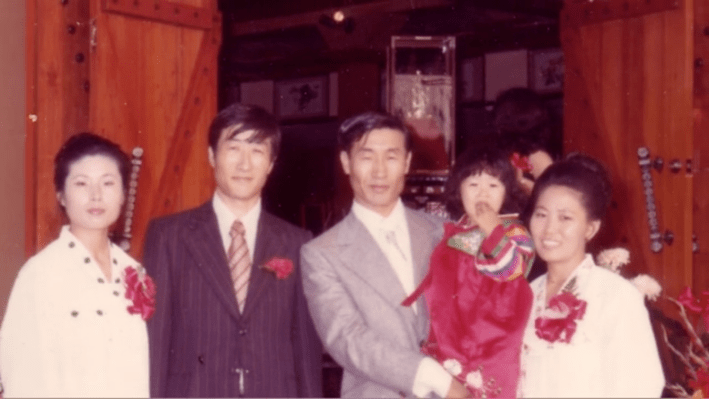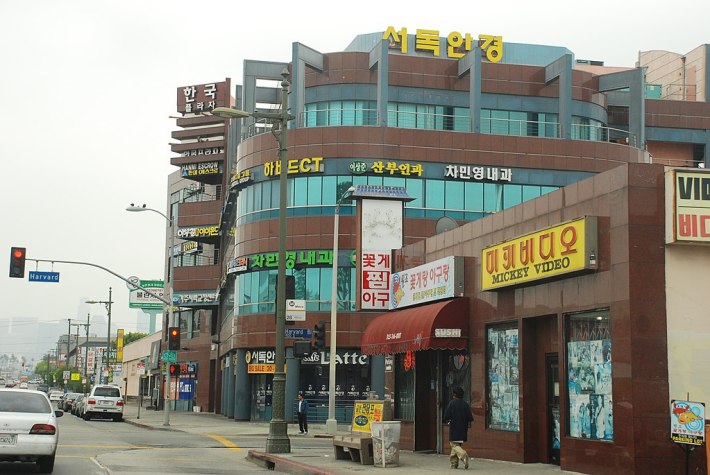[dropcap size=big]H[/dropcap]i Duk Lee, the founder of the world’s best known Koreatown, who sparked the formation of a community that would go on to alter the cultural landscape of Los Angeles, has died.
Late last week, approximately 100 people gathered to honor the life of Mr. Lee, in a Korean ceremony at Han Kook Mortuary in the West Adams District of Los Angeles. In a tearful tribute to his father, Lee’s son Roger shared a story about him and his Dad jumping boulders to avoid a swollen river while on a camping trip as a kid. He described his father as a “true American,” and a fearless man that “took all the risks and dealt with all the consequences.”
Lee passed on March 7 at the age of 79, according to Jenny Im with Han Kook Mortuary. The service was held March 14.
Lee sparked the formation of L.A.’s Koreatown, maybe the most well known in the world, for opening the first Korean-driven market at Olympic and Normandie in 1971. Then, the neighborhood was nearly destroyed during the 1992 L.A. Riots, only to rebound again to become one of the most diverse and exciting culinary communities in the country.
Lee was the former owner of the Olympic Market; as well as Young Bin Kwan, the first restaurant in L.A. to feature traditional Korean architecture. In his later life, Mr. and Mrs. Lee were also known as the thoughtful caretakers of Echo Garden, an eco-friendly nursery located on York Boulevard in Highland Park.
Lee started off in Los Angeles as an immigrant line cook and later a welder. In 1971, Lee and his wife Kil Ja, a nurse that he met in West Germany, took about $7,000 of their savings to open the Olympic Market – the first of its kind. The market struggled initially but three years after it opened, Lee and his wife were pulling in approximately $300,000 per month.
He sold Korean vegetables made locally and Korean-style cuts of meats, drawing dedicated Korean immigrant consumers from across L.A. The success of Olympic Market helped Lee see the potential in his community’s spending power, and paved the way for others to follow.
RELATED: Koreatown Signage Is a Defiant Indicator of the Power of Word-of-Mouth

[dropcap size=big]L[/dropcap]ee was born on July 29,1939, in Tae Jung, South Korea. In 1965, he fled dictatorship and emigrated to Europe. Lee traveled through several countries before landing in Germany, where he worked briefly as a miner before coming to Los Angeles in 1968.
In the mid 1970s other Korean businesses moved into the Olympic Market building and in 1974, Lee bought it. In the years that followed he expanded his business to include a restaurant and shopping mall on the same street.
Los Angeles saw significant growth in the Korean community at the time because of the Immigration Act of 1965, which eliminated racist restrictions on Asian migration to the United States. Around the same time the Mid-Wilshire area of Los Angeles fell into steep economic decline. This paved the way for Koreans to buy land, homes, and start businesses in the geographic core of Los Angeles.
Lee wanted to expand his business and create a centralized community for Koreans in Los Angeles. He envisioned a Koreatown much like Chinatown, and was inspired by how the Chinese were able to bring some of their culture with them to America in the form of architecture, signage, and food.
In the brief video below, Lee discusses his life story.
Lee’s Young Bin Kwan restaurant (VIP Palace) was the first building in Los Angeles to feature traditional Korean tiles. Lee traveled to Korea to secure them himself. Building in traditional Korean architecture was one of the most important aspects of Lee’s Koreatown. Today the original architecture of VIP Palace still stands but the eatery is long gone.
The iconic Oaxacan restaurant Guelaguetza has occupied the space since the 1980s, a reflection of modern Koreantown's rich Oaxacan presence. Young Bin Kwan served as more than just a place to eat, it was the spot in the neighborhood where people celebrated birthdays and weddings, held business meetings, and staged political dinners. For years the Young Bin Kwan dining rooms became the center of Korean immigrant life.
In the early 80’s Lee had plans to build a grand 200-room Korean hotel, but his quest to expand his business even further coincided with rising interest rates which ultimately lead him into financial ruin. In 1982, strapped with debt, Lee decided to cash out. He left Los Angeles for Africa and China, where he traveled for a decade looking to enter the tea trade.

Koreatown struggled, too, but the hub kept evolving, becoming the thriving business district that we know today. The community is ethnically diverse, and is thumping with restaurants, bars, cafes, and small businesses of every sort.
[dropcap size=big]L[/dropcap]ee was always honest about his successes and failures. While he paved the way for other Korean entrepreneurs to launch their businesses, he struggled to build the Koreatown that he envisioned and also struggled find long-term success as a businessman.
“I’ve lost much money, but I don’t regret what I’ve done since it all happened in Koreatown. My failures became fertilizer to bloom flowers,” Lee said in an interview with Korea Daily US in 2016.
Lee returned to Los Angeles, a little less than 10 years ago. Scarred from financial hardship, he and his wife isolated themselves from Koreatown and their old friends. They settled in a modest house on a quiet street in the hills of Silver Lake, and found a parking lot in Highland Park, which they turned into the nursery that became Echo Garden.
Lee spent the last years of his life working everyday at the nursery. He called it one of his greatest achievements.
RELATED: Piece of History: A Massive 144-Year-Old Tree Fell In the Heart of Los Angeles
Images and videos from “The Seoul of Los Angeles.” Reposted with permission by Kristy H.A. Kang.







